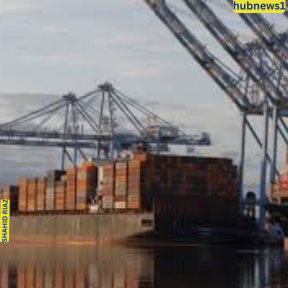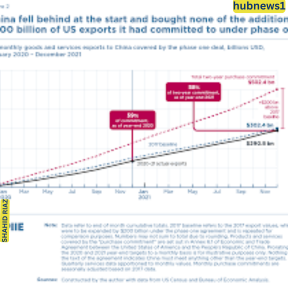
Trump Tariff: What are the global impacts of the US China trade war? If China cuts off trade with the US
Hubnews1- Trump’s Tariff U-turn has won, duties on electronics items have been reduced, a huge victory for China. Is the world still heading towards a very difficult economic period? Why are people expressing distrust in Trump? Has Trump released his wrong tariff policy? Has he figured it out? Has his tone changed or is Trump still stubborn? Let’s talk about all this.
Introduction
The echo in the world today is only one person who wakes up in the morning and makes a new announcement in the media and the whole world jumps after that. His people do not understand how to react to this decision of his and that person is apparently the president of the most powerful country in the world. Yes, I am talking about
Donald Trump Tariff Complete Study:
Donald Trump, who has made such decisions since his inauguration and made such controversial decisions and made such surprising decisions that the world is still dealing with its effects and even today, the topic I am going to talk about is shaking not only America but the entire world’s economy. I am talking about
The same tariff policy of Donald Trump’s tariff policy, the day it was announced, the day that that tariff policy was brought before the media and the whole world, the White House promoted it by calling it Freedom Day or Salvation Day. The policy is actually a team for the public. The uncertainty of the stock market and the fears of an economic crisis are causing concern. Today, we will examine the effects of this policy on the public reaction and its possible consequences on the global economy. Let’s see what the story is so far.
What are the global impacts of the US China trade war?
At the beginning of his second presidential term, Trump announced that he would rebalance global trade. His complaint was that the global economy was unbalanced. The United States imports things from many countries and does not impose taxes on them, but when American products go to these countries, they impose a lot of tariffs on them. In this way, he came up with a formula and from which country, how many imports are there, how many exports are there, how much tax is there? Based on this, he imposed a tax on them.
And what he calls the crime of salvation, that day he held a huge cardboard board in his hand and he announced it and since then a spectacle has started. And this is what has become a cause of concern in the whole world. Yes, on April 2, 2025, through an executive order, they first imposed a 10 percent basic tariff on all countries and additional reciprocal tariffs on some countries, including China, as I am telling you.
After that, the story went something like this: the rest of the world was left aside, but since China imposed retaliatory tariffs, and I don’t want to use the words that President Trump used, the world is kissing my feet, they said something else in English and are begging me, crying, crying, to withdraw the tariffs from me and do this. In this way, I and probably many leaders must have tried to make things right with a powerful country like America, such a big economic power, and maybe
There have been contacts, which Trump presented in very inappropriate words in this way, but China, which is the second largest economy in the world, did not respond in this way. China retaliated against the United States. Then, yes, the United States, Sir Trump, made further preparations against them, and imposed 104 percent. Then they raised it to 125 percent, which, together with the already existing 20 percent emergency tariff, became 145 percent.
READ MORE:China: says it will fight to the end after Trump threatens 50% additional tariffs
China also reacted and they also imposed a 125 percentTrump’s Tariff and with it they also announced that we do not want to be part of this madness, we will not increase tariffs after this. This was the last announcement that we made regarding traffic. In this way, China separated itself from this madness. White Falls claims that these tariffs will strengthen the American economy, promote local manufacturing, and will prove to be a laser attack against unfair trade. But did this really happen or was it just a loud threat, as we say in Punjabi that there was a ski bard that now seems to be weakening? I will tell you why I am saying this. In fact, if you look at the reaction of the American people, the picture looks completely different.
But did it really happen or was it just a loud threat, as we say in Punjabi, that there was a ski that is now weakening? I will tell you why I am saying this. In fact, if you look at the reaction of the American people, the picture looks completely different.
Unsatisfied with the tariff policy of the American Trump:

According to a recent survey, 62 percent of Americans are dissatisfied with Trump’s tariff policy, which has increased by four to five percent since last month, meaning that the number of dissatisfied Americans has increased. Those Americans who are expressing dissatisfaction are expressing distrust. People say that this policy is becoming a burden on their wallets. The prices of goods are increasing, especially daily necessities such as electronics and clothes.
And even groceries, if you look at the stock market, are also subject to fluctuations like a roller poster. On the one hand, Trump says that this policy will make the American economy great, while on the other hand, hedge fund heads like Ret Dalio are warning. That this situation could be worse than a recession. The head of the hedge fund Ret Deloitte has expressed his concern that the direction we are heading in, the direction it will take us, could lead us to a situation worse than a recession.
Anger among the American people and campaign promises:
The anger among the people is also because Trump had promised during the campaign that he would reduce prices, but now that shopkeepers and companies are passing the burden of tariffs on to consumers, people are feeling like they have been cheated. Hashtags like Trump tariff fail are trending on social media, where people are expressing their disappointment, distrust, dissatisfaction and anger. Now let’s talk
The most interesting twist is that Trump made many exaggerations, made many announcements, made many threats, his tone was arrogant and he told China that his behavior was arrogant and devoid of manners. The Chinese have told me They did not speak politely, they have insulted me, so in anger I have increased the tariff on them to 145%.
Just like they are the kings of the whole world and everyone else is their subject, they are kings and we are subjects, we are their subjects, they have made countless threats to their China that they will teach it a lesson, but then something strange happened, after imposing 125% tariff, China became silent and did not respond to America, they started doing their work quietly.
Because they had confidence in their manufacturing power, raw materials, energy resources, minerals, their supply chain routes and their markets, they became silent and started watching the spectacle in silence. If you remember, I told you that this war is going to last a long time, it is a chess game in which everyone will go wrong one by one.
Trump’s defeat or China’s victory:
Trump made an aggressive move, but now it seems that Trump is regretting his move or at least feeling worried because on April 12, it was suddenly announced that smartphones, computers and other electronics have been exempted from Trump’s reciprocal tariffs. Now this is a partial victory for China in a way.
Chinese products:
Electronics have been exempted from Trump’s reciprocal tariffs. Now, in a way, this is a partial victory for China. I read a very beautiful sentence in English newspapers. It is a steering competition. When two people look into each other’s eyes and the competition is to see who blinks first.
So people say that Trump blinked first. Therefore, in a way, this is considered a partial victory for China because 18% of China’s total exports consist of electronics. Now, why has this exemption been given? White House Press Secretary Caroline Lloyd says that Apple and other companies have the ability to start manufacturing in the United States and they have allocated $50 billion for this. But the question is
If Apple can really make iPhones in the United States, then why has this exemption been given? Tim Cook, as I told you in a previous podcast, said that I interviewed him. I was watching in which he said that we don’t go to China because we get cheap labor there, we go to China because we get skilled labor there, so in that case, can Kirland Lloyd’s claim be considered correct that Apple can actually make the iPhone in America
If that were the case, it would have started doing this right away and anyway, setting up the entire technology, setting up factories, training the manpower is not an easy task and its entire supply chain moves and deteriorates. Trump doesn’t have that much time to establish all this. So if this is not a sign of Trump’s retreat, then what else could it be? Moreover, the basic tariff on electronics has been set at ten percent.
So that 20 percent, but the 20 percent emergency tariff on goods coming from China is still in effect, meaning that the tariff on some electronics may still be effective, but well, the full 145 percent will save the American people. Now let’s see. Let’s take a look at which electronics items
that Americans use the most and are going to be the most affected. Among them, the most commonly used items that are made in China and will be used in the United States are iPhones and computers. 25 percent of Apple’s iPhones are made in China and the remaining 15 percent are manufactured in countries like India and Vietnam. As for computers and laptops,
88 percent are made in China. American companies will have some stock, but it won’t last long. As soon as the stock runs out, prices will increase. For example, if Apple manufactures outside of China or puts the full burden of tariffs on consumers, prices will increase drastically. Now, let’s look at the price range. The current price of the iPhone S Pro Max 256 GB is about $1,199. If 145 percent of the full Trump’s Tariff is passed on to consumers, its price could go up to $199.
That is, An increase of $800, but since electronics are exempt, the prices of electronics products may not increase immediately, but some increase is possible due to the 20% emergency tariff. For example, this price could go up to $1439. Similarly, a high-quality laptop like the Dell XPS 13, which is now priced at $1299, could go up to $2173 with a 145% increase.
The economic crisis brewing in America:
Now with the 20% emergency tariff, this price could go up to $15 59. Now such a sudden increase in prices is a big blow to American consumers. It is a headache, a worry. Those people who are already suffering from inflation are worried. Now let’s talk about the economic crisis that is brewing in America. Trump’s tariff policy has shaken the global stock markets.
Japan, Europe and even Asia have seen sharp declines. IMF Managing Director Christina Yurgiva has warned that these tariffs could prove disastrous for global trade. Experts for the US economy, such as the University of Pennsylvania’s Water Model, say that these tariffs could reduce GDP by up to eight percent
And the average household could suffer a loss of $ 58,000. Globally, this situation could have an impact similar to the 2008 financial crisis as supply chains are being affected and trade is decreasing. Countries like Vietnam and India in Asia that manufacture electronics and are also becoming centers for it

They may also be affected. China, which is an important pillar of global trade, is diverting its exports to other countries, which could further change the balance of global trade. China, if I may tell you, Xi Jinping is currently on a tour of Southeast Asia. He has visited Vietnam, is going to Cambodia, is going to Malaysia.
In Cambodia, rather, their New Year is going on and in such a situation, there is a holiday everywhere but they are rolling out the red carpet for Shenzhen Pink and along with that, talks are going on with Malaysia. China is looking for new markets among its neighbors and among its friends, but it will also be a big challenge for these countries.
Because Chinese products are obviously low-priced and they have to make a thoughtful decision that their own products, whatever is the certificate of their own country, whatever products are being made inside their country, somewhere they do not have an impact on them, they do not have much impact, but anyway China is looking in a different mode at the moment.
They seem to be more responsible at the moment. Now this whole crisis that I presented to you that is happening in the world, there is anger in America now among the people, in addition to this, the entire global economic community is worried because the big economists are unaware of this.
That let alone the market with the President, what you are going to face, the direction you are going in, could be worse than a recession, so what else can be done to avoid this crisis? First of all, it can be done to emphasize negotiations.
The United States should work with its allies, especially European and Asian countries, on fair trade agreements. There must be diplomatic talks with China as well, and if possible, some friendly countries can be used as a bridge between them.
The second is to invest in local production. Instead of tariffs, local manufacturing can be promoted by giving incentives to American companies, but this requires long-term planning. The third suggestion I would like to make is that measures should be taken to protect consumers.
In the short term, tax exemptions or subsidies can be given to reduce the burden of prices on consumers. Apart from this, global cooperation is also a solution, and how can it be achieved in such a global context? Institutions such as the IMF, the WTO, should be created together with them to create a balanced policy
which takes into account the interests of all countries. Sir, these are some suggestions from us if President Trump accepts them. And one last suggestion is that for God’s sake, stop thinking of yourself as one who is in a Western movie and you have revolvers and you are taking them out and fighting a dog. Sir, these are not like that. These threats and intimidation do not befit you.
This does not befit your position. This is going to affect your country, the people of your country and then most importantly the whole world and the whole world’s economy and its many dangerous consequences.
It is going to affect the economy and it can have many dangerous side effects. This tariff policy of yours has ignited a fire that can affect not only the United States but the whole world. Public anger, rising prices and economic uncertainty indicate that the matter is that you have to act wisely.
There is a need to take steps that can dispel these negative perceptions. These were some of my requests. This was my request to you. The rest I leave to my viewers. I leave to the viewers to tell me what this whole game is. First of all, tell me whether Trump’s first round, which is, has he really lost Trump, that is, Xi Jinping and China won the first round and forced Trump to take a U-turn.
And secondly, if Trump still doesn’t understand the tariffs and if he continues on this path, do you think the world is heading towards another recession with the market? And the third and most important point is whether Trump He has understood, his tone has changed, he said that China knows Xi Jinping, he is a very good friend of mine and we will talk and do this and this conversation looks very different
READ MORE:European stocks plunge 4% as global tariffs escalate… Rheinmetall drops 5%
In this style of conversation in which it was said that China’s tone was insulting, do you think that Trump has understood and Trump has lost the first round and how will the next rounds be fought now? China has achieved a model victory. The whole world is looking at it like yes, it is a responsible superpower. When he said that we will not increase tariffs further and we will not be part of this madness.
This is tantamount to disturbing the whole world, so his image has improved all over the world. People are more attracted to China. They are listening to China more. I think America has suffered a loss. America has lost the first round. What do you think about this? Trump has understood, no. And really, Trump’s Tariff has lost the first round and Xi Jinping has won? I will definitely let you know what you think about this.
FAQ:
Q: What are the global impacts of the U.S.-China trade war?
The U.S.-China trade war, initiated under the Trump administration with tariffs on hundreds of billions of dollars worth of goods, has had widespread global effects, including:
- Supply Chain Disruptions – Many companies reliant on Chinese manufacturing faced higher costs and delays, forcing some to relocate production to Vietnam, India, or Mexico.
- Higher Consumer Prices – Tariffs increased costs for U.S. and global consumers, particularly for electronics, machinery, and retail goods.
- Slowed Global Growth – The IMF and World Bank warned that trade tensions reduced global GDP growth by dampening investment and trade flows.
- Shift in Trade Alliances – Some nations, like Brazil and Australia, expanded trade with China to fill gaps left by reduced U.S. exports.
- Market Volatility – Stock markets reacted to tariff announcements, creating uncertainty for investors.
Q: What if China cuts off trade with the U.S.?
A full decoupling would have severe consequences:
- U.S. Economy: Short-term shortages of electronics, pharmaceuticals, and consumer goods; long-term inflation risks.
- China’s Economy: Loss of a major export market could hurt manufacturing and employment, though China may pivot to other markets (e.g., EU, ASEAN).
- Global Recession Risk: A sudden breakup could trigger financial instability and supply chain collapses, worsening inflation worldwide.
- Tech & Innovation: Disruption in semiconductor, AI, and green tech sectors, where the two economies are deeply intertwined.
- Geopolitical Tensions: Escalation in military or diplomatic conflicts, possibly drawing other nations into economic blocs (e.g., U.S.-led vs. China-led trade networks).
Q: Is reconciliation possible?
Future negotiations or policy shifts (e.g., tariff reductions) could ease tensions, but long-term “decoupling” efforts in key industries (chips, energy) may persist.
china tariffs,trump tariffs,trade war,china,global tariff reaction,us china trade,us china tariffs,china trade war,us china trade war,china retaliation,donald trump,china us trade war,trump administration,trade,trump tariffs china,trump tariff plan,global markets,trump trade war,trump china trade war,global trade,president donald trump,trump,tariffs,trump trade tariffs,china tariff hike,china tariff impacts,u.s.-china trade war
Copyright hubnews1 Recorder, 2025




